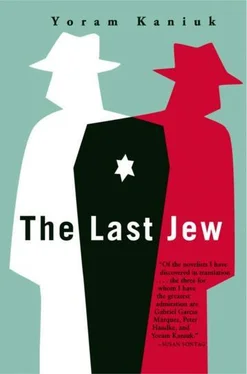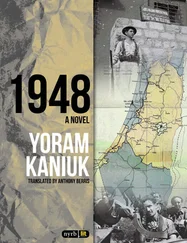But while Boaz was completely sunk in his new creation, Henkin suddenly gaped out of the thoughts from his starched suit, became serious, grave, the teacher I met on the Tiberias Tsemakh road, that gentle savage who read us poems and quarried and knew how to love this body of mine with hands full of softness and honor, and he said: The poem, Boaz, what about the poem?
What poem?
The poem Menahem wrote.
Oh.
I want it.
But…
No but.
Boaz came back to reality and once again found himself sitting in the cafe. The waitress was sitting in a corner humming to herself. The rain subsided and strips of blue sky appeared between the clouds.
The poem disappeared.
Find it.
Where?
You'll find it, Boaz Schneerson, and you'll bring it. You know where I live, you came once, and now I know why.
Henkin leaned forward, his eyes cold, Henkin's dead son, says Boaz with restrained fear, is indifferent now, his dead son wrote him a poem. What does he want from me, fucking Henkin?
Bring it!
I'll look for it, said Boaz. Henkin observes him seriously, Boaz is terrified in the chair.
You will bring it.
A teacher's grammar: I shall bring, you will bring, we shall bring, where shall I bring it from?
Bring it from wherever you bring it, says the teacher of Hebrew language and literature.
I'll look for it.
You'll find it, says Henkin and starts to get up, and then he turns to Boaz: Tomorrow afternoon. I can't, said Boaz.
Tomorrow afternoon, said Henkin and all the softness disappeared, no poet was written on his brow… a father's acquisitiveness, Boaz didn't take it into account. Tomorrow afternoon. Deliverance Street, near Singer's store. I'm waiting for you, his voice is cruel, rigid. He wants to pay, but Henkin doesn't let him. I'll pay, says Henkin. He counts the coins, puts the wallet back in his pants pocket, puts on his coat, his hat, repeats: Tomorrow afternoon. When Teacher Henkin goes outside the wind scatters the fastsailing clouds. Across the street, on the wall of the house, gigantic wet spots appear, the street is gleaming with the sudden sun, Boaz remains on the corner, lights a cigarette, puts the match in his mouth, and tramples on the cigarette.
Tape / -
Report 5/677-E. S.-(The Last Jew)
By 1946 we found out about Ebenezer Schneerson. We had been tracking him for about a year and in January 1946, we created an initial contact with him. His impresario-as Samuel Lipker was called-presented us with unacceptable conditions. He demanded that the material to be published be recorded in his name, and that in exchange for every hour of debriefing the aforementioned (Samuel Lipker) would be paid ten dollars. Our then modest institution could not have accepted those demands and henceforth the meeting with Ebenezer was postponed until the year nineteen fifty-six 1956. When he came to us, Ebenezer was fifty-six years old. He suffered from pain in the pelvis, his fractures are patched up but are abnormal, his body is scarred from the blows he received, and even though the scars have healed he urgently needed treatment. His heart is abnormal, his pulse is too rapid, his blood pressure is high, he was borderline diabetic.
This report does not constitute research but is an introduction to research that will be documented forthwith, and is to be seen only as an interim report. When Ebenezer Schneerson came to us, we discovered that during the years since his release from the camp his intellectual activity had been reduced to a minimum. Only after long conversations did he become free for what he himself called "the need to do something in this life." He could not say explicitly "this life of mine." The word "mine" wasn't clear to him. His life was reduced to words he guarded. The body was only a tool to protect what his brain preserved. In conversations we held with him at the time of awakening (seventeen recorded conversations) when he was in a non-alert condition, he talked a lot about being the only survivor of the Jewish nation. In sixteen of the conversations, he repeated the sentence: "All the Jews died and I have to tell the world what they knew."
In the period he stayed with us, he created a genuine and first contact with a stranger. Traveling to the nearby hospital to treat his burns, he met Mrs. Fanya R. (Debriefing File Number F.R./6/444). Fanya R. was hospitalized in various institutions and when Ebenezer met her, she was in the small hospital then financed by a fund called the Fund for the WarDamaged, whose origin is not clearly defined. These were people sent to the camps for obscure reasons, or whose postwar status is not clear. Mrs. Fanya R. was sent to the camp because she was the lover and mother of the daughters of a Jew named Joseph Rayna, and later it turned out that Ebenezer thought this Joseph was his father. Joseph Rayna was shot to death in Dachau. The aged Joseph Rayna met Fanya R. under circumstances that the abovementioned is not interested in telling. She gave birth to twins named Danka and Toleda. When the girls were five years old, Fanya R. learned that her mother, Kathe nee Prausen, married her husband Mr. Prausen when Fanya R. was a year old. Before that, her mother lived for some time with another person. To make a long story short, note that Fanya R. discovered that Joseph Rayna was her mother's lover and that she was not only the mother of his daughters, but also their sister. Her emotional condition, which was bad in any event, grew even worse and in the camp she cleaned latrines. Her daughters were taken away from her and when the war was over, she went in search of them. They were killed by Dr. Mengele, whose experiments on twins are widely known. Only when she met Ebenezer did something stir in Fanya R. that had previously been dead. After a certain period, her condition improved, her attempts to hurt herself almost stopped, and in March nineteen fifty-eight, Ebenezer Schneerson and Fanya R. were married in a modest civil ceremony.
Ebenezer claimed that he was the stepfather of both his wife and her daughters. As far as he was concerned, he was the brother of his daughters, his own uncle, and even his mother's brother. I'm almost my own father, he smiled at us. In a ceremony held in our institution, Ebenezer adopted Fanya R.'s dead daughters, and, the two were retroactively named Danka and Toleda Schneerson.
Ebenezer claimed to us that he had married Fanya R. out of sympathy. He loved, he said, only one woman, whose name was Dana and his mother murdered her. Samuel Lipker, he said, was searching for him because they had gotten separated from one another in a heavy fog in the port of Marseille.
After he started opening up to his past (for example, his recall of Joseph Rayna and his relation to him), it became clear from things he dredged up from inside himself with difficulty (we spent several days on that) that he had wandered in Europe and searched for somebody he thought was his father and on his way he came to Russia. After the signing of the MolotovRibbentrop Pact and the division of Poland, he was expelled (as a Pole) from the Polish territory that had stopped being Russian and was then expelled to Russia as a Ukrainian. In the struggle between the Belarussians and the Ukrainians for German sympathy, he was caught in a maze of schemes and this is not the place to describe them, and in the twists of the cosmos he discovered that the Jews were glad when the Russians came, but were bitterly disappointed. The Poles in the area were landowners who had previously been moved there by the Polish government to hinder the progress of the Belarussians who were expecting the Germans, while as for the Germans, they disappointed them too after they came. Crossing the border to German Poland (along with a group of Jewish youths returning to organize the Pioneer Youth there), he was captured by the Germans. He managed to run away and came to a Polish village. The Poles who thought he was a Ukrainian turned him over to the Belarussians who judged him for what they called "despicable Polish subversion." Naive and uneducated, he didn't understand the delicate subtleties in those relations of nations, and in Operation Barbarossa he was captured again. When he ran away (he was swift and strong), he was tortured by Yugoslavian partisans who were searching for a way out to the Russian forests and thought he was a hostile Jewish-German spy. He was caught in a tight net-and this is not exactly the place to go into detail-of Lithuanian, Russian, Jewish, Belarussian, Ukrainian, and Polish schemers, and at any rate, his Judaism was only one more pretext for abusing him, and a millstone to hang accusations of identity on him of which he was ignorant. Lacking an ideological background, it was easier for him when he was captured by the Germans as a Jew. The Sonderkommando caught him and this time he couldn't run away. Now his pedigree was clear. No importance was ascribed to the fact of his birth in Palestine.
Читать дальше












